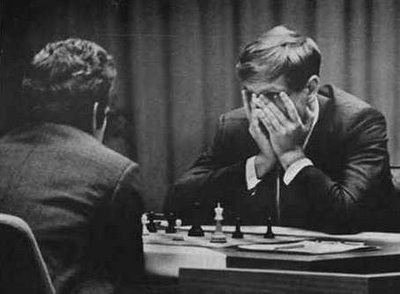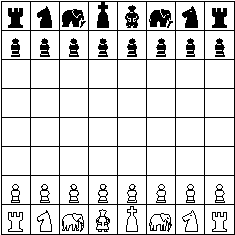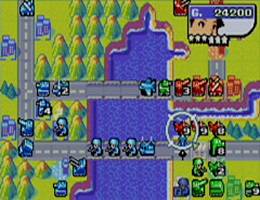 In Bali recently I saw dozens of pairs of people sitting on the sidewalks in front of their souvenir stores and playing chess. I thought that this was really neat. I assume that the trend got started because among the souvenirs that the Balinese mass-produce are wooden chess sets, but even so there was something fascinating about seeing non-Westerners playing chess for fun. I suppose I’ve got a stereotype of chess as a highly refined and intellectual European pursuit, to be carried out in utter silence by perspiring Slavs or Icelanders with rumpled suits and enormous egg-like craniums. Seeing this reminder that this was just a stereotype and that it’s a fun game for just about anyone was quite inspiring. I’m trying to brush up on my chess skills. It is, however, difficult to polish a turd. I’m horrible at chess. It requires long-range strategic thinking which, as Kim knows from when we’re planning vacations years in advance, is difficult for me. But anyway, I’m working on it.
In Bali recently I saw dozens of pairs of people sitting on the sidewalks in front of their souvenir stores and playing chess. I thought that this was really neat. I assume that the trend got started because among the souvenirs that the Balinese mass-produce are wooden chess sets, but even so there was something fascinating about seeing non-Westerners playing chess for fun. I suppose I’ve got a stereotype of chess as a highly refined and intellectual European pursuit, to be carried out in utter silence by perspiring Slavs or Icelanders with rumpled suits and enormous egg-like craniums. Seeing this reminder that this was just a stereotype and that it’s a fun game for just about anyone was quite inspiring. I’m trying to brush up on my chess skills. It is, however, difficult to polish a turd. I’m horrible at chess. It requires long-range strategic thinking which, as Kim knows from when we’re planning vacations years in advance, is difficult for me. But anyway, I’m working on it.So anyhoo, a little internet research on the history of chess and what do I find but something INCREDIBLY INTERESTING. At least to me. The bishops are supposed to be elephants!
 From this website on the Indian game which is apparently the direct ancestor of our chess set:
From this website on the Indian game which is apparently the direct ancestor of our chess set:The pieces were raja (king), mantri (counsellor, ancestor of the ferz), gaja (elephant, later called fil), asva (horse), ratha (chariot, later called rook), and pedati (infantry or pawns).
The elephants/bishops used to move a little differently; if you have Java working properly you can play the old version here.
Not only is that little historical background into the pieces interesting in itself, but those Sanskrit or whatever names of the pieces are quite meaningful too. “Raja”, “Mantri” and “Gaja” are all still Malay words, and “Ratha” and “Pedati” really show their indo-european origins. We also used to eat at an Indian restaurant in Munich called Radha which I believe was supposed to mean “chariot”. As if that weren’t enough, “Mantri” a.k.a. Menteri or minister in Malay is supposedly the origin of the word “Mandarin”.
 Overall I think I like chess better now that I know the pieces are all supposed to represent actual military field units and not some weird lathe-turned royal family out on a pleasant stroll with their favorite priests and a couple of self-propelled castle towers. Au contraire! Chess is the prequel to Advance Wars.
Overall I think I like chess better now that I know the pieces are all supposed to represent actual military field units and not some weird lathe-turned royal family out on a pleasant stroll with their favorite priests and a couple of self-propelled castle towers. Au contraire! Chess is the prequel to Advance Wars.

2 comments:
Those are really interesting facts on chess! I used to be in the chess club (cause we have to join at least one club in high school for our curriculum thingy) and i find it very erm, exciting in terms of great "brain exercise". Hahaha :P
Amiable post and this enter helped me alot in my college assignement. Say thank you you as your information.
Post a Comment